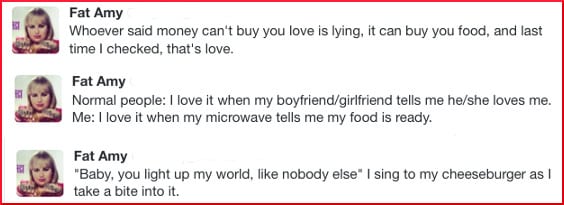Childhood Obesity News has discussed the change that took place in the latest edition of the Diagnostic and Statistical Manual, which now places Binge Eating Disorder (BED) in its own category, under Feeding and Eating Disorders. (The others are Pica, Rumination Disorder, Avoidant/Restrictive Food Intake Disorder, Anorexia Nervosa, Bulimia Nervosa, Other Specified Feeding or Eating Disorder, and Unspecified Feeding or Eating Disorder.)
Also mentioned was the distinction made by Dr. Vera Tarman between BED and food addiction. Along with her colleague Phil Werdell, Dr. Tarman was active in trying to get food addiction included in DSM-5, to no avail. She calls the omission “a poor reflection of our clinical reality.”
What are the diagnostic features of BED? It’s not a one-time occurrence, but happens over and over again, and the habit causes great personal distress. Unlike the anorexic, the binge eater does not try to make up for all those extra calories by vomiting them up or exorcising them with exercise. As with other DSM-5 disorders, there is a checklist. When a patient shows up with 3, 4, or all 5 of these hallmarks, the clinician can be fairly confident of the diagnosis.
- Eating until feeling uncomfortably full
- Eating large amounts of food when not feeling physically hungry
- Eating alone because of being embarrassed by how much one is eating
- Feeling disgusted with oneself, depressed, or very guilty after overeating
- Eating much more rapidly than normal
On the other hand, those guidelines leave some room for misinterpretation and error. Four of the elements are not scientifically verifiable, being based (necessarily) on self-reporting. Only one can be tested against observable reality: the rapid eating. How is anyone to know if they eat faster than other people? Sure, kids around the cafeteria table will make merciless fun of gobblers. But as people grow older and learn to dissemble, what they do in public is not always the same as what they do in private. On any given day, a person might meet ten closet binge eaters, and never know. Furthermore, according to Horace Fletcher, almost everybody eats too fast anyway, and even if it is normal, it shouldn’t be.
In “Why Are Children Overweight?” Dr. Pretlow’s 2010 presentation to the Royal College of Physicians National Obesity Forum, he hypothesized that binge eating might be an amalgam of comfort eating and a displacement activity.
A recent study published in the International Journal of Obesity reported that the brains of overweight and obese kids are hypersensitive to sugar. There is, in the words of Prof. Kerri Boutelle, an “enhanced response” to the chemical. She explains:
This elevated sense of ‘food reward’ – which involves being motivated by food and deriving a good feeling from it could mean some children have brain circuitries which predispose them to crave more sugar throughout life….The brain images showed that obese children had heightened activity in the regions of brain involved in perception, emotion, awareness, taste, motivation and reward.
Some binge eaters specialize in sweets, and comfort eating very often involves sugar-intensive foods. In the realm of food addiction, sugar has been accused of being an addictive drug. How does this information fit in with all the rest? How does it conform with the long list of causes for obesity compiled by Lauren Rossen, PhD, in her book Obesity 101. Sometimes it seems as if an overarching yet elusive Unified Field Theory of obesity lies tantalizingly close but as yet unguessed-at.
Your responses and feedback are welcome!
Source: “New in the DSM-5: Binge Eating Disorder,” nationaleatingdisorders.org, 06/05/13
Source: “Why obese kids feel better than thin kids after eating food,” TheHealthSite, 12/12/14
Image by Fat Amy


 FAQs and Media Requests:
FAQs and Media Requests: 











